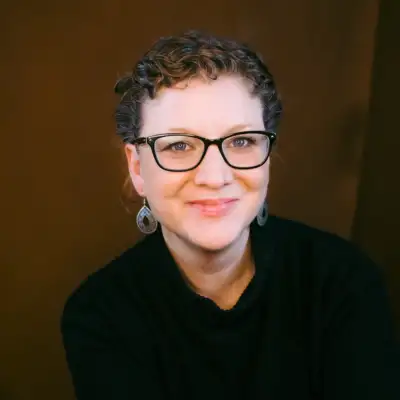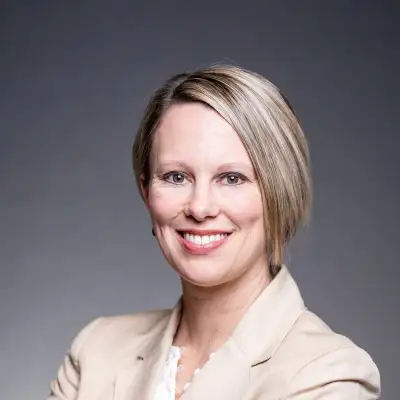Creators and Guests



What is Navigating Net Zero with Alexia Kelly?
Navigating Net Zero is a new podcast featuring conversations with practitioners and experts who are working through the complex realities of corporate decarbonization and sustainability.
We demystify and highlight the challenges, opportunities, and real-world experiences faced by the people leading their institutions' net-zero journeys.
Hosted by internationally-renowned climate change expert Alexia Kelly and brought to you by the Carbon Policy & Markets at the High Tide Foundation, Navigating Net Zero hopes to inspire action from this generation of climate leaders and the next.
Alexia Kelly: Hi everyone. Welcome back to Navigating Net Zero, the podcast where we talk about what’s working, what’s not, and what’s next on the journey to net zero for companies and the global economy. I’m delighted today to be joined by my longtime co-conspirator, friend, and colleague Ashley Allen. Ashley, thank you for joining me and for all of the work that you’re doing. I’m excited to dig into the conversation.
Ashley Allen: Thanks for having me. It’s great to be able to explore these issues today.
Alexia Kelly: Absolutely. Let’s start with your background. You’ve been both in government and in corporate sustainability roles. Like me, you made the transition from government to the private sector. Can you tell me about your roles at Mars and Oatly, and what that transition was like?
Ashley Allen: Sure. I moved into the private sector at a really interesting moment for climate change. The Paris Agreement had just been adopted, and the world was watching whether the U.S. was serious about action.
I made the transition at the start of the Trump administration, joining Mars as their Climate Change Lead. It was a time when many companies were just beginning to understand what net zero meant and what role they could play. At Mars, we set an ambitious full value-chain climate goal as part of the company’s Sustainable in a Generation program, which reflected their long-term, family-owned perspective.
While there, I worked on policies to prevent deforestation in the cocoa supply chain, renewable energy procurement through power purchase agreements, and started to build understanding of climate risk for Mars’s global operations and supply chains.
After several years, I joined Oatly as Chief Sustainability Officer. That was a completely different perspective—going from a massive, established multinational to a fast-growing plant-based company with a strong sustainability mission at its core. At Oatly, the focus was on raising awareness about the environmental impacts of food and diets—helping people understand that agriculture and what we eat matter just as much as energy or transportation in the climate fight.
Alexia Kelly: So much to unpack there. Let’s start with Mars. They tend to keep a low profile, but I see them as a company that puts their head down and does the work. They’ve made impressive progress on their targets. Can you walk us through how Mars set its goals and what implementation looked like?
Ashley Allen: Being a privately held, family-owned company shaped Mars’s approach. They’re not publicly traded, so they don’t show up in shareholder rankings or headlines. But within the sustainability community, Mars is recognized as a leader and has made real progress toward its mid-term reduction goals and its longer-term net zero goals.
The process started with data. We built a comprehensive greenhouse gas inventory, making assumptions where the methodologies were still emerging. We analyzed land-use change data for key ingredients—cocoa, palm oil, beef, among others. That analysis revealed Mars’s carbon footprint was roughly comparable to that of a medium-sized country like Kenya. That was a striking realization: a single company’s footprint could equal that of a nation.
We also drew on the “planetary boundaries” framework to contextualize responsibility: given its impact, what responsibility does Mars have to reduce it? That approach guided the company in setting ambitious goals.
Alexia Kelly: In public companies, shareholder pressure often drives ambition. In a privately held company, what drives the decision to act?
Ashley Allen: At Mars, it was a combination of family leadership, employee expectations, and customer demands. The Mars family became increasingly committed as they learned more. At the same time, talent recruitment and retention were factors—new hires wanted to know the company’s position on sustainability. Retailers like Walmart were also pressuring suppliers to step up. Those combined forces reinforced the family’s own conviction.
Alexia Kelly: You mentioned Mars’s footprint being comparable to a country’s. But unlike a nation, Mars’s emissions come from a highly fragmented, global supply chain. Can you talk about the challenges of Scope 3 accounting and strategy, both at Mars and at Oatly?
Ashley Allen: For most companies, supply chain emissions represent 75–99% of their footprint. In food, it’s often around 90%. That means going far beyond your direct suppliers—into multiple tiers until you reach the farm level.
To quantify this, companies rely on third-party research and “emission factors” for commodities, which are often averages and sometimes outdated. The process requires humility. At Mars, we set a baseline, launched our goal, and began taking action. But when methodologies changed for cocoa, our footprint increased by 10% overnight—not because emissions grew, but because of new data. That kind of recalibration is common.
The same happened at Oatly when factors for oats and additives were revised. Executives with finance backgrounds found it uncomfortable—because unlike financial accounting, sustainability accounting is imperfect and subject to change. Companies have to be transparent and adaptable.
On the action side, we prioritized. Operational emissions—factories, offices—could be addressed quickly with renewable energy, efficiency, and PPAs. For Mars, cocoa was the big hotspot; for Oatly, oats. We focused there, building partnerships, engaging governments and farmers, and piloting regenerative agriculture practices. Neither sector is solved, but progress has been significant.
Alexia Kelly: How did carbon credits fit into these strategies?
Ashley Allen: Credits weren’t central to Mars or Oatly’s supply-chain goals, but they were part of broader conversations. At Mars, we worked with organizations like Gold Standard to explore how market principles could apply within supply chains—what’s now called the “value change” approach. After I left, Mars set a formal net zero goal that includes a clear strategy for credits.
At Oatly, the European discourse was more skeptical of credits at that time—more focused on direct action. But we did explore how to ensure farmers were incentivized financially for sustainable practices, whether through credits or other mechanisms. The broader agricultural sector continues to experiment with market-based approaches to support farmers.
Alexia Kelly: I completely agree that we need to move past “one is good, one is bad” thinking. Accounting principles from carbon markets—like how to measure, verify, and credit action—are now being adapted for supply chains. We need comprehensive transparency systems that capture all the good work companies are doing, even deep in their supply chains.
Ashley Allen: Exactly. There’s a close connection. Tools and data developed for carbon markets are now being repurposed for value-chain accounting. Companies need a wide portfolio of solutions. Ambitious goals won’t be met by any single approach—they require exploring every possible tool.
Alexia Kelly: You’ve worked as CSO in both a huge multinational and a smaller, fast-growing company. What was that transition like?
Ashley Allen: The principles are the same: embed sustainability into the way the company does business. The big difference is resources. At Mars, with steady profits, there was budget for innovation and thought leadership. At Oatly, still striving for profitability, we had to embed sustainability into existing business investments—like making new factories sustainable.
Regardless of size, the goal is the same: sustainability has to be part of how the company operates.
Alexia Kelly: Budget is always a challenge. How did you make the business case for investments?
Ashley Allen: You have to be agile. The case can change quarter to quarter. At Oatly, renewable energy in China wasn’t feasible at first, but within a few quarters, the market shifted and opportunities emerged. Energy investments often have clear business benefits: compliance with emerging rules, reduced regulatory risk, reputational gains, and in some markets even financial returns.
Supply chain interventions often involve higher transaction costs—engaging suppliers, piloting regenerative practices—but the expectation is that they pay off through resilience, productivity, and reputational benefits. Logistics and transport remain the hardest. Costs are still significantly higher for sustainable fuels, and the business case is challenging.
Ultimately, though, sustainability solutions align with long-term resilience. Climate disruptions and price volatility are increasing. Investing in sustainability builds stability and reduces risk over time.
Alexia Kelly: That connects to adaptation and resilience, which we don’t talk about enough. How did those issues show up in your work?
Ashley Allen: Companies rarely separate mitigation and adaptation. They think about resilience—how to withstand volatility, whether from weather, geopolitics, or other disruptions. Sustainability solutions contribute to resilience. And executives outside sustainability—CFOs, supply chain leaders—are increasingly recognizing this. That makes resilience a powerful part of the business case.
Alexia Kelly: Let’s talk about politics. You and I both started in government—me at the State Department’s climate office, you at USAID. Today we’re seeing climate offices shuttered and resources pulled back. What does that mean for the role of the private sector and voluntary action?
Ashley Allen: First, I want to acknowledge the extraordinary public servants who built so much expertise in government. The world has relied on them, and the loss of that capacity is significant.
The resource gap is huge—too big for companies alone to fill. But there are opportunities. Companies with capabilities in areas like climate data or monitoring can step in, often more efficiently with new technologies like AI. Partnerships with philanthropy can also help focus resources.
And thanks to years of capacity-building, many emerging economies are now more sophisticated and are moving forward on their own—launching carbon markets, advancing policies. That gives me hope: new leaders are stepping up.
Alexia Kelly: I agree. It also underscores that we need the private sector to lead—especially large global companies with big footprints. Their actions can drive innovation, scale, and cost reductions that benefit others.
Ashley Allen: Yes—and not only big emitters, but “solution companies” too. Companies whose products and services can help others decarbonize. That was the shift for me moving from Mars to Oatly: not only focusing on footprint, but also on “handprint”—how a company’s products drive broader change.
And we can’t just wait for a return to the old system. We need to build something new—more inclusive, more resilient, with clearer benefits for more people.
Alexia Kelly: Yes. We need to build back better, in a way that’s more equitable and responsive. Finally, what gives you the most hope right now?
Ashley Allen: Nature. We don’t talk enough about it in the climate conversation. I’ve been working more on forests and jurisdictional REDD+ programs—state-level, locally driven efforts to reduce deforestation.
At a time when we’re losing so much, I hope we can refocus on what we value most. Forests are invaluable—for climate, biodiversity, people. That gives me hope.
Alexia Kelly: Couldn’t agree more. Ashley, thank you for your leadership, for your work in corporate sustainability, and for talking with me today. It’s always a pleasure, and I look forward to continuing the conversation.
Ashley Allen: Thanks, Alexia.